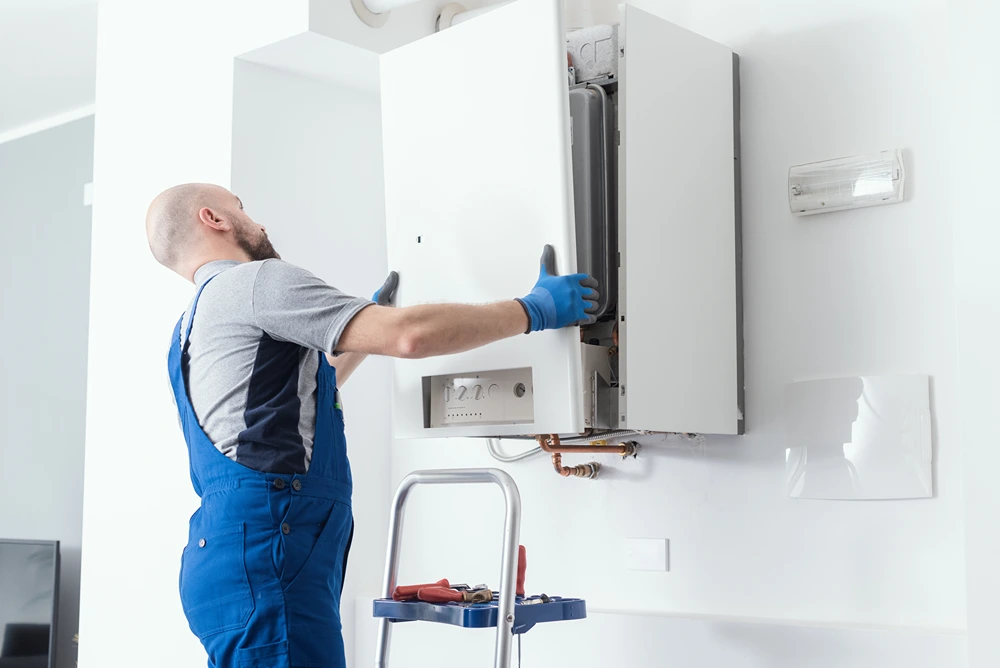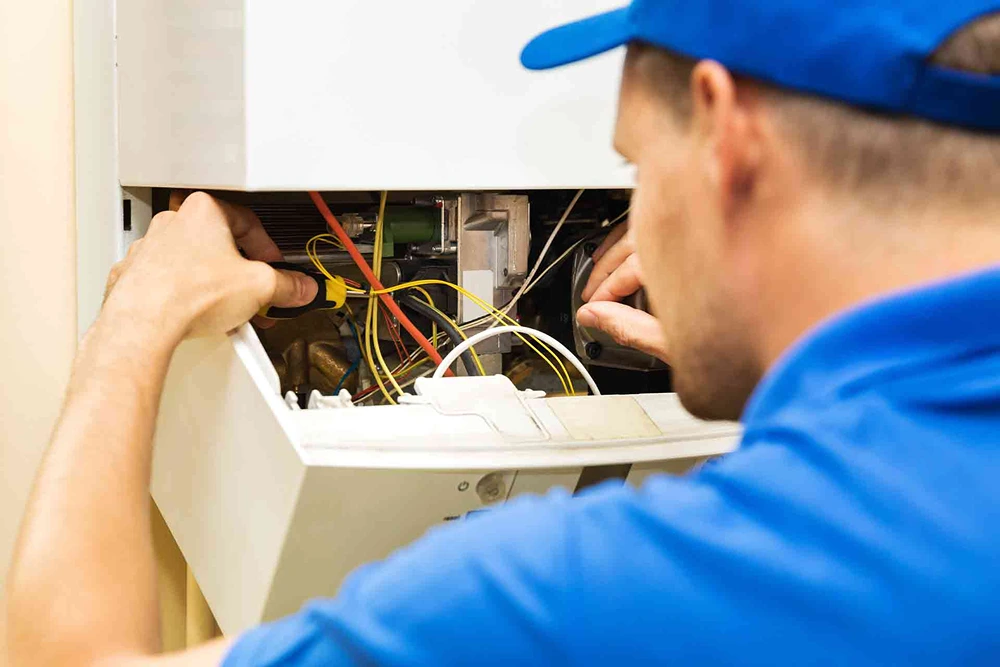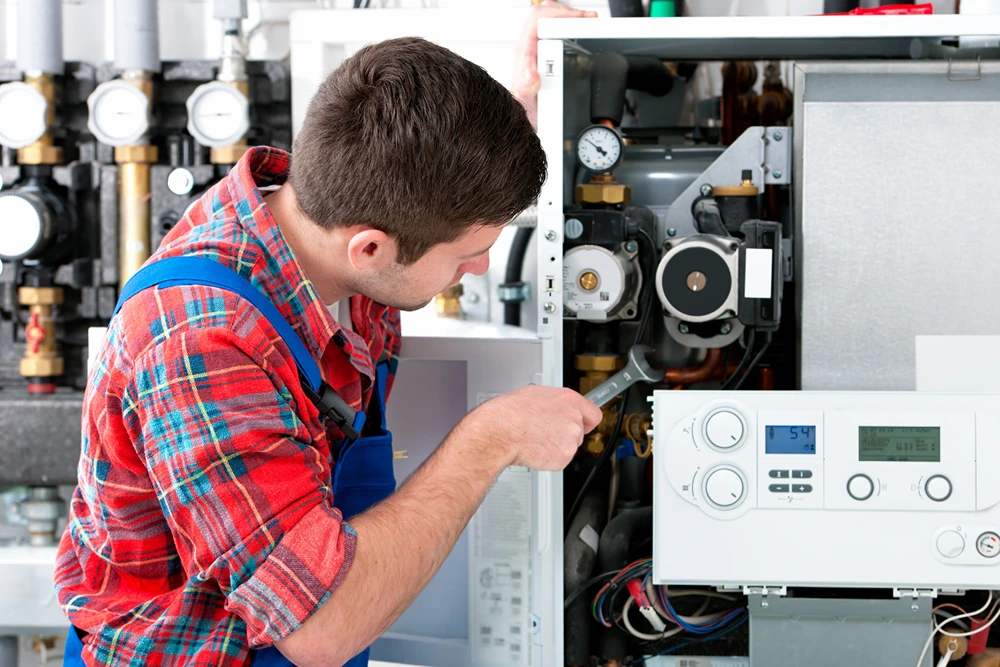Replacing a boiler can seem straightforward, but it’s easy to make costly errors. Are you aware that an incorrectly sized boiler can lead to inefficiency and inflated energy bills? Missteps in boiler replacement can compromise comfort, escalate costs, and impact the environment. This guide identifies seven prevalent pitfalls, offering insights to navigate the complexities of boiler replacement effectively and ensure a seamless transition to efficiency and warmth. Understanding the right time and method for replacing a boiler can significantly impact your home’s comfort and energy efficiency. By staying informed on best practices and common mistakes, you can make the process smoother and more cost-effective.

Choosing the Wrong Boiler Size
Proper boiler sizing is crucial for efficiency and performance. An incorrectly sized boiler can either overwork or underperform, leading to inefficiencies and higher energy costs. Boilers that are too small might struggle to meet the heating demand, while oversized boilers can cycle on and off frequently, wasting energy. Matching the boiler size to the property’s heating needs ensures consistent performance and optimal energy usage. For more detailed guidance, consider exploring how to go about choosing the right boiler size. This decision is crucial, as the correct size will not only meet your heating demands but also enhance the efficiency of your home’s energy consumption.
Consequences of Incorrect Sizing
- Inefficiency and higher energy costs
- Increased wear and tear on the boiler
- Inadequate heating or hot water supply
- Higher initial costs for an oversized boiler
- Potential for increased maintenance and repair costs
To ensure proper sizing, always conduct a heat loss survey before selecting a boiler. This survey calculates the heating requirements based on the property’s size, insulation, and other factors. Consulting with a professional heating engineer can help determine the appropriate boiler size. Additionally, consider the boiler’s modulation range, which allows it to adjust its output to match the heating demand, enhancing efficiency.
Ignoring Energy Efficiency Ratings
Energy efficiency ratings are a critical consideration when replacing a boiler. Understanding boiler efficiency ratings can help you make informed decisions that lead to significant savings on energy bills. These ratings provide insight into how well a boiler converts fuel into heat, which directly affects your home’s energy consumption and environmental impact. Overlooking these ratings can lead to significantly higher energy bills and increased long-term costs. Boilers with high-efficiency ratings convert more fuel into heat, reducing the amount of energy wasted. This not only saves money but also reduces the carbon footprint of your home. Choosing a boiler with a lower efficiency rating might seem like a cost-saving measure initially, but it can result in higher overall expenses due to increased energy consumption and potential repairs.
| Efficiency Rating | Annual Saving (£) |
|---|---|
| A (90%+ efficiency) | £300-£400 |
| B (86%-90% efficiency) | £200-£300 |
| C (82%-86% efficiency) | £100-£200 |
To make a cost-effective choice, it is essential to understand these energy efficiency ratings. The rating is usually displayed on the boiler’s energy label. ‘A’ rated boilers are the most efficient and provide the highest annual savings, while ‘B’ and ‘C’ rated boilers are less efficient. Always interpret these labels carefully and consider the long-term savings in energy bills. Consulting with a professional can also help in selecting a boiler that offers the best balance between initial cost and long-term savings.
Hiring Unqualified Installers
Professional installation is crucial when replacing a boiler to ensure safety and efficiency. The boiler installation process requires expertise to avoid common pitfalls and ensure that the system operates at its best. Hiring certified professionals guarantees that your boiler is installed according to industry standards, providing peace of mind and optimal performance. Failing to hire certified professionals can lead to numerous issues, including compromised performance and increased safety hazards. Certified engineers, particularly those who are Gas Safe Registered, have the necessary skills and knowledge to install boilers correctly and safely. This registration is a mark of quality and assurance, indicating that the engineer has undergone rigorous training and adheres to the highest safety standards. Disregarding the importance of professional installation can result in poor performance and hazardous conditions.
Risks Associated with Unqualified Installers
- Improper installation leading to inefficiency
- Safety hazards such as gas leaks
- Voiding manufacturer warranties
- Potential legal issues and fines
- Increased repair and maintenance costs
- Reduced lifespan of the boiler
To find and verify qualified professionals, start by checking for Gas Safe registration, which is a legal requirement for anyone installing gas appliances in the UK. This registration can be verified online through the Gas Safe Register website. Additionally, seek recommendations from friends or family and look for reviews or testimonials from previous clients. Always request to see the engineer’s identification card, which includes their unique licence number. Ensuring you hire a qualified professional not only guarantees a safe and efficient installation but also protects your investment by maintaining the boiler’s warranty and extending its lifespan.
Neglecting Ventilation Requirements
Poor ventilation during boiler installation can lead to the build-up of harmful gases, posing severe health risks. Inadequate ventilation can cause dangerous situations, such as carbon monoxide poisoning, which is potentially fatal. Carbon monoxide is an odourless, colourless gas that can accumulate if the boiler isn’t properly vented. Ensuring proper ventilation is not just a matter of efficiency but also a crucial safety measure to protect occupants from harmful exposure.
There are specific types of ventilation requirements that must be adhered to when installing a boiler. These include flue ventilation and external air supply. The flue system is responsible for safely expelling exhaust gases from the boiler to the outside. It must be installed according to local and national codes, particularly for sidewall venting, to avoid any back-drafting of gases into the living space. Additionally, boilers require an external air supply to ensure there is sufficient oxygen for the combustion process. Without adequate external air, the boiler can operate inefficiently and produce more harmful by-products.
To ensure proper ventilation, always follow the manufacturer’s guidelines and local building codes. Conduct a thorough inspection of the installation site to identify any potential obstructions that could impede airflow. Hire a certified professional to install the boiler, as they will be knowledgeable about the correct venting procedures and safety standards. Regularly inspect and maintain the venting system to ensure it remains clear and functional. These steps will help maintain a safe and efficient boiler operation, reducing the risk of harmful gas build-up.

Not Comparing Quotes from Different Installers
Comparing quotes from multiple installers is essential to avoid unnecessary expenses and ensure you receive the best service for your boiler replacement. Additionally, understanding the impact of a new boiler on energy bills can further guide your decision-making process. A new, efficient boiler can significantly reduce your energy costs, making it a worthwhile investment in the long run. Choosing the cheapest option without considering long-term costs can be costly. Lower-priced boilers may have higher maintenance costs and shorter lifespans, leading to greater expenses over time. Additionally, not budgeting for potential additional costs, such as new piping or alterations to the existing heating system, can lead to unexpected financial burdens. By obtaining multiple quotes, you can evaluate the overall value provided by different installers and make an informed decision.
Factors to Consider When Comparing Quotes
- Installation costs
- Long-term maintenance costs
- Warranty and aftercare services
- Customer reviews and installer reputation
To make an informed decision, start by requesting detailed quotes from at least three different installers. Evaluate each quote not just on the price but also on the scope of work, the quality of the boiler being installed, and the services included, such as warranties and aftercare. Additionally, consider the reputation of the installers by reading customer reviews and seeking recommendations. Taking these steps ensures that you choose an installer who provides the best balance of cost, quality, and service, ultimately leading to a more reliable and efficient boiler installation.
Overlooking the Importance of Regular Maintenance
Regular maintenance is essential for keeping your boiler in optimal condition. To ensure longevity and efficiency, explore strategies to maximise the lifespan of your new boiler. By adhering to a regular maintenance schedule, you can prevent breakdowns, maintain energy efficiency, and extend the operational life of your boiler, ensuring it serves your home reliably for years to come. Ignoring routine maintenance checks can lead to a significant reduction in the boiler’s lifespan and efficiency. Scheduled check-ups by qualified professionals can ensure that your boiler operates efficiently, preventing costly repairs and ensuring optimal performance. Regular maintenance helps to identify and address small issues before they escalate into major problems, thereby saving money in the long run.
Potential Issues Prevented by Regular Maintenance
- Preventing breakdowns
- Ensuring energy efficiency
- Extending boiler lifespan
- Maintaining safety
- Complying with warranty terms
To set up a maintenance schedule, start by consulting your boiler’s manual for the manufacturer’s recommended maintenance intervals. Most manufacturers suggest an annual service by a qualified technician. Keep a log of all maintenance activities, including dates and any issues found or repairs made. This log can be useful for future reference and warranty claims. Additionally, consider setting reminders for your annual maintenance check to ensure it’s never missed. Regular maintenance not only prolongs the life of your boiler but also ensures that it operates safely and efficiently, providing peace of mind and comfort throughout the year.

Final Words
In the action of replacing a boiler, avoiding common mistakes such as choosing the wrong boiler size, ignoring energy efficiency ratings, and hiring unqualified installers is crucial. Proper attention to ventilation requirements, comparing quotes, and not overlooking regular maintenance are also key.
Understanding these pitfalls ensures effective boiler performance, enhanced energy savings, and safety.
By focusing on these aspects, homeowners can achieve cost-efficient, reliable, and environmentally-friendly heating solutions. Avoiding common mistakes to avoid when replacing your boiler is essential for long-term satisfaction and comfort.
FAQ
What are common mistakes to avoid when replacing your boiler?
One common mistake when replacing a boiler is failing to properly size the new unit. An incorrectly sized boiler can lead to inefficiency and higher energy costs.
How can the wrong boiler size affect my home?
Choosing the wrong boiler size can lead to various issues, including:
- Inefficiency and higher energy costs
- Increased wear and tear on the boiler
- Inadequate heating or hot water supply
- Higher initial costs for an oversized boiler
- Potential for increased maintenance and repair costs
Why is energy efficiency important when replacing a boiler?
Overlooking energy efficiency can result in higher energy bills. Opt for boilers with high-efficiency ratings to save on energy costs over time.
How do I compare boiler efficiency ratings?
| Efficiency Rating | Annual Saving (£) |
|---|---|
| A (90%+) | £500 |
| B (85-89%) | £300 |
| C (80-84%) | £200 |
Understanding these ratings helps in selecting a cost-effective boiler while ensuring long-term savings.
Why should I hire qualified installers for my boiler replacement?
Using certified professionals ensures that the boiler is installed correctly and safely. Hiring Gas Safe Registered engineers is crucial.
What are the risks of hiring unqualified installers?
The risks of hiring unqualified installers include:
- Improper installation leading to inefficiency
- Safety hazards such as gas leaks
- Voiding manufacturer warranties
- Potential legal issues and fines
- Increased repair and maintenance costs
- Reduced lifespan of the boiler
How can I ensure proper ventilation for my new boiler?
Inadequate ventilation can cause a build-up of harmful gases. Ensure that the boiler has proper flue and external air supply ventilation to prevent dangerous conditions.
Why is it important to compare quotes from different installers?
Comparing quotes helps you find the best deal without sacrificing quality. Consider factors like installation costs, long-term maintenance, warranty, and the installer’s reputation.
What factors should I consider when comparing installation quotes?
When comparing installation quotes, consider:
- Installation costs
- Long-term maintenance costs
- Warranty and aftercare services
- Customer reviews and installer reputation
Why is regular boiler maintenance important?
Regular maintenance ensures the boiler operates efficiently and prevents issues like breakdowns, reducing its lifespan, and safety concerns. It also complies with warranty terms.
What issues can regular boiler maintenance prevent?
Regular maintenance can prevent:
- Breakdowns
- Reduced energy efficiency
- Shortened boiler lifespan
- Safety hazards
- Non-compliance with warranty terms


